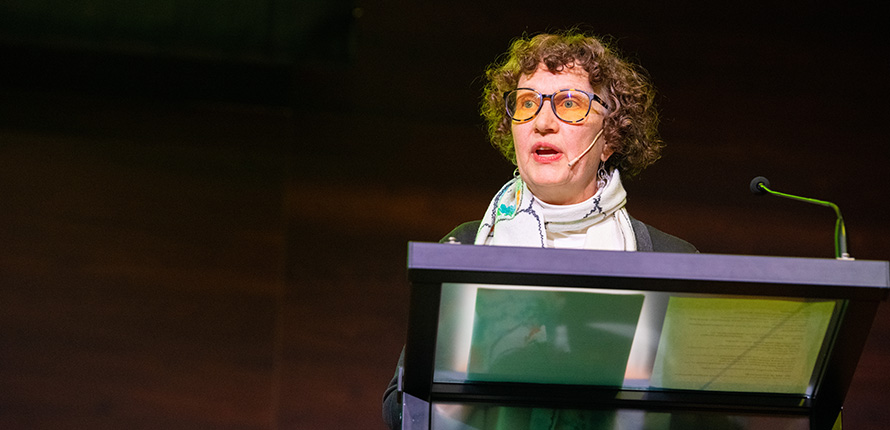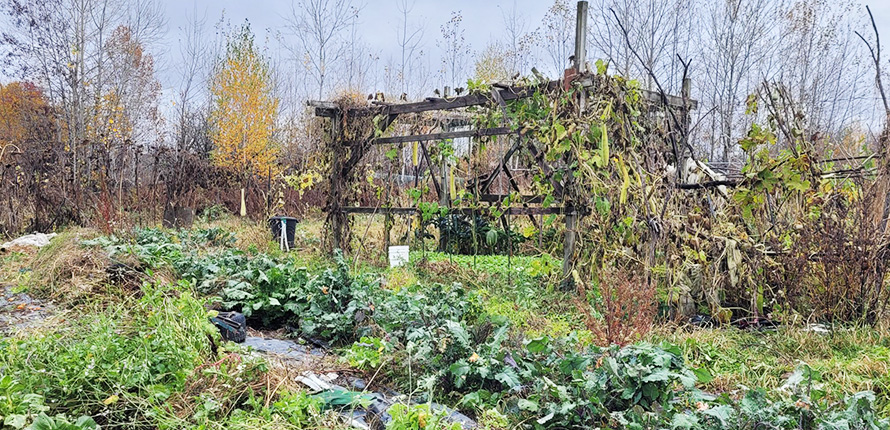Search for academic programs, residence, tours and events and more.
UNESCO Chair on Food, Biodiversity and Sustainability Studies renewed for four more years at Laurier
April 3, 2024
When Alison Blay-Palmer was appointed the United Nations Educational, Scientific and Cultural Organization (UNESCO) Chair on Food, Biodiversity and Sustainability Studies in 2019, she described herself as a “possible-ist.” With added resources, connections and support from one of the most important global institutions, she envisioned making change through her research.
Blay-Palmer couldn’t have anticipated that over the course of her first four-year term as chair, a pandemic, international conflicts and economic pressures would further complicate the untangling of intricate global food systems. With her spirit of possibility leading her forward, Blay-Palmer saw these obstacles as opportunities for productive disruption. When COVID-19 heightened awareness of local food networks, for example, Blay-Palmer led a task force to guide post-pandemic infrastructure spending.
“We have made progress to counter the negative impacts of industrial food by helping to increase sustainability in regional food systems,” says Blay-Palmer, a professor at Wilfrid Laurier University and founder of the Laurier Centre for Sustainable Food Systems. “I remain cautiously hopeful.”

Conceptualized as an “ideas laboratory,” the UNESCO chairs program facilitates cooperation and knowledge exchange between academics, policymakers and communities. UNESCO recently renewed the Chair on Food, Biodiversity and Sustainability Studies until 2027, allowing Blay-Palmer to continue pursuing its mandate. Her focus will remain on promoting biodiversity conservation, addressing climate change and reducing food insecurity.
“I see the chair as a platform for change that engages with many, many people around the world,” says Blay-Palmer. “I see my role as a conductor, enabling these people and projects to work together in a positive way.”
Moving forward, Blay-Palmer sees corporate interests as the biggest hurdle for food systems to overcome. In the face of big money and government lobbying, her response is to take a regional approach.
“If you think about a global or even national food system, where do you go to change it?” says Blay-Palmer. “We’ve learned that food system sustainability can be meaningfully transformed at a regional level. We are figuring out what interventions are working and then sharing that information with the people who matter, including the public.”
As she begins her second term as chairholder, Blay-Palmer highlights a few key achievements from her first term and the chair’s research priorities for the next four years.
Highlights from the first term of the UNESCO Chair on Food, Biodiversity and Sustainability Studies
In December 2022, Blay-Palmer travelled to Montreal to join more than 10,000 delegates from 196 countries for COP15. She moderated an event about agricultural biodiversity and participated in the development of the Kunming-Montreal Global Biodiversity Framework, a historic plan to halt and reverse biodiversity loss.
“The globalized food system is responsible for about 80 per cent of biodiversity loss because of lost land and our soil is being destroyed by industrial agriculture that undermines fair livelihoods for farmers and leaves more than 3 billion people unable to afford a healthy diet,” says Blay-Palmer. “We can address this through practices like agroecology. The framework set a lot of precedents that we can build on through our research, including active language about the inclusion of Indigenous peoples and local communities.”
Over the course of seven years, more than 90 organizations and 130 individuals came together under Blay-Palmer’s leadership for community-driven research on sustainable food systems. FLEdGE partners were grouped into three international working groups and seven regional research nodes across Canada. Their work was supported by a $2.47 million Partnership Grant from the Social Sciences and Humanities Research Council of Canada (SSHRC) and more than $6.5 million in matching funds.
Knowledge sharing was a top priority for Blay-Palmer and her FLEdGE colleagues. All of the project’s findings are archived on the FLEdGE website, along with resources, stories and podcasts.
Urbal is a tool to map how food system innovations create changes over time, helping to uncover barriers to and enablers of sustainability. Blay-Palmer and her colleagues joined forces with international partners including the French Agriculture Research and International Cooperation Organization to hold participatory workshops and develop this free, open-access methodology for researchers, policymakers and practitioners.
The online guide is currently being tested in eight urban innovation labs located in the United States, Brazil, Germany, South Africa, Japan, Italy, France and Morocco.
Priorities for the second term of the UNESCO Chair on Food, Biodiversity and Sustainability Studies
Together with 35 partner organizations across four continents, Blay-Palmer was awarded $2.5 million from SSHRC to lead the FLOW Partnership. Over the next seven years, FLOW research will map and monitor specific practices that are driving sustainability on a regional level and amplify them to influence meaningful, long-term policy decisions globally.
“This is the first study to compare regional sustainable food systems over time,” says Blay-Palmer. “We’re engaging policymakers in each country from the beginning so they can tell us where the gaps are and what kind of metrics they need to implement changes. In Brazil, our partners are literally bringing decision-makers into the field and educating them about what an agroecological food system can look like. As a result, laws have been changed to accommodate a more regionalized food system.”

Increasing migration and population growth in Kampala, Uganda is exerting pressure on local infrastructure, challenging the city to ensure clean water, stable livelihoods and food security. Blay-Palmer and her colleagues are partnering with the Centre for Liveable Cities Kampala and Ugandan scholars to address these complex issues.
The research team will test the feasibility of community-managed projects that aim to reduce food waste, which will hopefully result in cleaner water and improved food security. Findings will be shared with the Kampala Capital City Authority and community members.
The Certificate in Food and Sustainability is a five-course credential open to all Laurier undergraduate students, helping them build the skills needed to become future-ready changemakers in the field. Over the next four years, Blay-Palmer aims to expand availability of the certificate and make it fully accessible online, as well as in person.
“We’re taking our understanding of sustainable food systems and providing an opportunity for learning,” says Blay-Palmer. “And eventually, hopefully, an opportunity for professional development.”
Blay-Palmer was interviewed on season three, episode 1 of Handpicked: Stories from the Field, a podcast exploring how sustainable food systems research can change how we produce, deliver and eat food. It is produced by the Laurier Centre for Sustainable Food Systems and available wherever you get your podcasts.